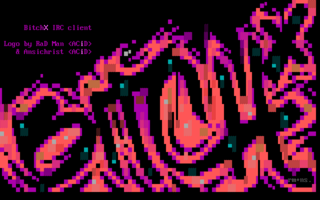
GnuCash is an accounting program that implements a double-entry bookkeeping system. It was initially aimed at developing capabilities similar to Intuit, Inc.'s Quicken application, but also has features for small business accounting. Recent development has been focused on adapting to modern desktop support-library requirements.

BitchX is a free IRC client that has been regarded as the most popular ircII-based IRC client. The initial implementation, written by "Trench" and "HappyCrappy", was a script for the IrcII chat client. It was converted to a program in its own right by panasync. BitchX 1.1 final was released in 2004. It is written in C and is a TUI application utilizing ncurses. GTK+ toolkit support has been dropped. It works on all Unix-like operating systems, and is distributed under a BSD license. It was originally based on ircII-EPIC, and eventually it was merged into the EPIC IRC client. It supports IPv6, multiple servers and SSL, and a subset of UTF-8 with an unofficial patch.

The Z shell (Zsh) is a Unix shell that can be used as an interactive login shell and as a command interpreter for shell scripting. Zsh is an extended Bourne shell with many improvements, including some features of Bash, ksh, and tcsh.
DICT is a dictionary network protocol created by the DICT Development Group in 1997, described by RFC 2229. Its goal is to surpass the Webster protocol to allow clients to access a variety of dictionaries via a uniform interface.
RAR is a proprietary archive file format that supports data compression, error correction and file spanning. It was developed in 1993 by Russian software engineer Eugene Roshal and the software is licensed by win.rar GmbH. The name RAR stands for Roshal Archive.

SmallBASIC is a BASIC programming language dialect with interpreters released as free software under the GNU General Public License version 3 for Microsoft Windows, Linux and Android.

SuperTux is a free and open-source two-dimensional platform video game published under the GNU General Public License (GPL). The game was inspired by Nintendo's Super Mario Bros. series; instead of Mario, the hero in the game is Tux, the official mascot of the Linux kernel.

FontForge is a FOSS font editor which supports many common font formats. Developed primarily by George Williams until 2012, FontForge is free software and is distributed under a mix of the GNU General Public License Version 3 and the 3-clause BSD license. It is available for operating systems including Linux, Windows, and macOS, and is localized into 12 languages.

GForge is a commercial service originally based on the Alexandria software behind SourceForge, a web-based project management and collaboration system which was licensed under the GPL. Open source versions of the GForge code were released from 2002 to 2009, at which point the company behind GForge focused on their proprietary service offering which provides project hosting, version control, code reviews, ticketing, release management, continuous integration and messaging. The FusionForge project emerged in 2009 to pull together open-source development efforts from the variety of software forks which had sprung up.

Mercurial is a distributed revision control tool for software developers. It is supported on Microsoft Windows and Unix-like systems, such as FreeBSD, macOS, and Linux.
File sharing is a method of distributing electronically stored information such as computer programs and digital media. Below is a list of file sharing applications, most of them make use of peer-to-peer file sharing technologies.

Frets on Fire (FoF) is a free, open-source music video game created by Finnish independent video game developer Unreal Voodoo. Players use the keyboard to play along with markers which appear on screen, with the aim to score points, achieve a high point multiplier, and complete a song. Frets on Fire was the winner of the Assembly 2006 game development competition.
sdcv is the command line version of StarDict developed by Evgeniy A. Dushistov and Hu Zheng. It employs all the dictionary files that belong to StarDict. It is licensed under the terms of the GNU General Public License.
FreeArc is a free and open-source high-performance file archiver developed by Bulat Ziganshin. The project is presumably discontinued, since no information has been released by the developers since 2016 and the official website is down.

Kiwix is a free and open-source offline web browser created by Emmanuel Engelhart and Renaud Gaudin in 2007. It was first launched to allow offline access to Wikipedia, but has since expanded to include other projects from the Wikimedia Foundation, public domain texts from Project Gutenberg, many of the Stack Exchange sites, and many other resources. Available in more than 100 languages, Kiwix has been included in several high-profile projects, from smuggling operations in North Korea and encyclopedic access in Cuba to Google Impact Challenge's recipient Bibliothèques Sans Frontières.

The KDE Gear is a set of applications and supporting libraries that are developed by the KDE community, primarily used on Linux-based operating systems but mostly multiplatform, and released on a common release schedule.

Q4OS is a light-weight Linux distribution, based on Debian, targeted as a replacement for operating systems that are no longer supported on outdated hardware. The distribution is known for an addon called XPQ4, which adds themes intended to replicate the look and feel of Windows 2000 and Windows XP.












